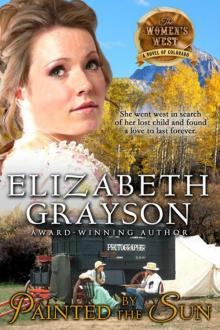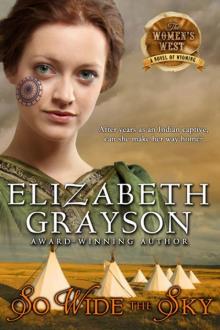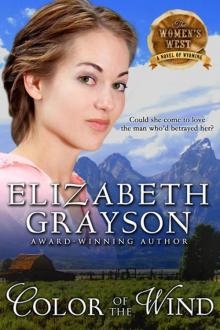- Home
- Elizabeth Grayson
Painted by the Sun
Painted by the Sun Read online
Painted By The Sun
The Women's West Series
Book Four
by
Elizabeth Grayson
Award-winning Author
PAINTED BY THE SUN
Reviews & Accolades
Finalist, Willa Cather Literary Award presented by Women Writing the West.
Top 1001 Historical Romances, RT Book Club Reader
Barclay Gold—Top Ten Favorite—Lake County Romance Writers
Write Touch Readers Award, Wisconsin Romance Writers
"Grayson has the master's touch... in this seamless, wondrous Western tale."
~Book Page
"You'll cherish the sheer wonder of a story that will make you cry and sigh with happiness."
~Kathe Robin, Romantic Times
"Elizabeth Grayson is a marvel! Excellent book!"
~The Huntress Book Reviews
Published by ePublishing Works!
www.epublishingworks.com
ISBN: 978-1-61417-740-1
By payment of required fees, you have been granted the non-exclusive, non-transferable right to access and read the text of this eBook. No part of this text may be reproduced, transmitted, downloaded, decompiled, reverse engineered, or stored in or introduced into any information storage and retrieval system, in any form or by any means, whether electronic or mechanical, now known or hereinafter invented without the express written permission of copyright owner.
Please Note
This is a work of fiction. Names, characters, places, and incidents either are the product of the author's imagination or are used fictitiously, and any resemblance to actual persons, living or dead, business establishments, events or locales is entirely coincidental.
The reverse engineering, uploading, and/or distributing of this eBook via the internet or via any other means without the permission of the copyright owner is illegal and punishable by law. Please purchase only authorized electronic editions, and do not participate in or encourage electronic piracy of copyrighted materials. Your support of the author's rights is appreciated.
Copyright © 2000, 2012, 2015 by Karen Witmer-Gow. All rights reserved under International and Pan-American Copyright Conventions.
Cover by Kim Killion www.thekilliongroupinc.com
eBook design by eBook Prep www.ebookprep.com
With love and appreciation to Betty and Bob, my adopted parents, and my birth mother, R.M.—wherever you are.
Acknowledgments
At the end of a book I am always filled with gratitude, not just for the fact that I have reached the final page, but also to the many people who have generously given of their time and expertise in helping me meld fiction with reality.
Perhaps the most daunting aspect in undertaking this particular story was learning about early photography. In my quest to track down early women photographers and their work, I wish to thank my good friend Joyce Schiller of the Reynolda House Museum in Winston-Salem for setting me on the trail of those lady pioneers.
I certainly would not have come as near to being able to reproduce the process of wet-plate photography without the assistance and expertise of Rob Gibson. Rob, who is practicing his Civil War-era art in Gettysburg, Pennsylvania, these days, not only shared with me pertinent facts, but gave me a sensory understanding of what it is like to work in this medium. He answered my thousand and one questions and was generous enough to review the section of the manuscript that dealt with sensitizing photographic plates and making photographs by this method.
In dealing with the law, trials, and lawyerly aspects of the novel, I turned to fellow novelist Kathleen Sage, and to my good friend John Villeneuve. John's patience in answering my highly speculative questions about jurisdiction and frontier law is something for which I am profoundly grateful. I will admit that I simplified some of the information he gave me in the interest of the story, so any derivations or distortions thereof are completely the fault of the author.
I would like to express my appreciation to the people working in the Western Collection of the Denver Public Library for their guidance, and especially to reference librarian Barbara Dey at the Stephen H. Hart Library in the Colorado Historical Society for answering pertinent questions I had about Denver in the period of the novel.
As always I owe enormous thanks to Eileen Dreyer, my critique partner, who has helped to shepherd one more book through to completion. Also I'd like to thank Meg Ruley, whose excellent questions helped me hone Shea's character. I also appreciate my companions at a particular dinner at the RWA conference in Anaheim who were willing to "talk plot." They helped me more than they will ever know.
And thanks to my husband Tom, of course, for putting up with the more-than-usual upheaval of his life this time.
I couldn't have done this without any of you.
The woman who makes photography profitable must have common sense, unlimited patience to carry her through endless failures, equally unlimited tact, good taste, a quick eye, and a talent for detail.
Frances Benjamin Johnson
Female Photographer 1864-1952
Photography is a picture painted by the sun.
Ambrose Bierce
Writer and Journalist (1842-1914)
Chapter 1
Breckenridge, Colorado
Fall 1875
Cameron Gallimore hated hangings. He hated the gallows standing stark against the sky. He hated the way crowds gathered beneath it hours before. He hated the anticipation in their faces and the bottles of whiskey they passed from hand to hand. He especially hated hangings when he was the judge who'd condemned the man to die.
Drawing a dry, sharp breath of resignation, Cameron resettled the low-crowned Stetson on his head and stepped off the end of the boardwalk. The vacant lot near the edge of town where the gallows had been constructed was full of miners. As he waded in, the men closed ranks around him, clapping him on the back and offering congratulations.
Their approval rankled him. It wasn't as if he'd done anything to be proud of. It wasn't as if he'd earned the right to condemn a man by setting a fine example. He'd done his job. He'd done his job so well in the last four years, he'd sentenced eleven guilty men to the rope.
They'd hang the twelfth this afternoon.
Cam was pushing his way toward the base of the scaffold steps where he would stand to watch the sentence carried out when he caught sight of something he'd never seen at an execution before. Dead center and half a dozen yards back from the deck of the gallows a photographer had set up his camera.
The very idea that someone was going to immortalize Crazy Joe Calvert's execution stoked up a firestorm in Cam's chest. He came about in mid-stride and shouldered his way toward where the photographer stood all but hidden in the folds of the camera's focusing cloth.
Dear God! Cam thought with a shudder. What kind of a man took pictures of a hanging?
No kind of a man, as it turned out.
Cam stopped dead when he saw there was a green twill skirt flowing from beneath the drape of the camera's dark-cloth. Scuffed black leather boots with high heels and embroidered shanks peeked from below the skirt's fashionably banded hem. The hand adjusting the knob on the side of the lens was small, delicately boned, stained black at the fingertips—and distinctly feminine.
Feeling unaccountably more aggrieved, Cameron stepped closer and smacked his own big palm down on the top of the square oaken box. "What the hell do you think you're doing?" he demanded.
The figure beneath the heavy fabric jerked back, popping from beneath it like a gopher bolting out of its burrow.
The photographer was a woman, all right—a small, sweetly rounded woman; all startled and smudged and glaring mutinously. She'd hung her bonnet over one of the c
amera's tripod legs, and the friction with the dark-cloth had mussed her hair. It stood out in curly, gingery-brown wisps and straggled in corkscrews at her temples, cheeks, and nape. Her jaw angled gently above the high, banded collar of her jacket, and her mouth was bowed and soft as a baby's. It was a far more open and arresting face than Cameron had been expecting.
"And just who are you, sir," she demanded, narrowing eyes of cool, luminous green, "that you've a right to ask me what I'm doing here?" Though the words were clearly belligerent, they were sweetened with the hint of Irish brogue.
Around the two of them a few miners turned from the contemplation of their whiskey bottles to something that might, for the moment at least, prove more diverting.
"I'm the man responsible for all of this, and I can't say I recall giving a photographer permission—"
The woman straightened from her shoe soles, which brought her delicate, upturned nose almost level with the center of Cameron's chest. "I don't suppose I really need your permission to take this picture, now do I?" she asked. "This is a public street. This is a public event..."
Cam wasn't sure what was strictly legal, nor did he mean to debate with her, but the question was on his lips before he could help himself. "What purpose could you possibly have for taking photographs of a hanging?"
There was neither apology nor compromise in her demeanor. "Selling photographs is how I earn my livelihood."
"And someone will be willing to pay you for—for a picture of this?" he asked, incredulous.
"Newspapers back east," she confirmed. "If I send them the particulars, they'll write a story and make an engraving from my photograph. Sensationalism sells papers."
It was true enough. Newspapers these days would print anything.
All at once Cameron glimpsed the businesslike determination in the set of that jaw and the clear, hard practicality in those pale eyes. But then, it wasn't as if her reasons for wanting the photograph mattered to him. Even someone who'd stabbed his partner to death in front of witnesses deserved to die with a modicum of dignity.
"Well, I'm afraid you'll have to find something else sensational to send them," he said and reached for her camera.
"Here, now!" she cried, catching at his sleeve. "What do you think you're doing?"
A few more men turned to stare at them.
Though she clung like a terrier, Gallimore managed to shake her off and collapse the tripod. "I won't have you taking pictures of one of my hangings."
"One of your hangings?" she echoed, her voice rising. "Just how exactly is this your hanging? Is it your neck they'll be stretching?"
Some of the miners around them snickered.
Cam ignored the men and shifted the weight of the camera against his shoulder. He lifted the legs of the tripod off the ground. The contraption was a good deal heavier than it looked.
"I'm Judge Cameron Gallimore," he told her. "I presided over Mr. Calvert's trial, and I'm responsible for seeing his sentence carried out."
"Then go on and see to your job, Your Honor," she told him pointedly. "Just unhand my camera so I can see to mine."
"Go ahead and let her take her picture," one of the miners encouraged him. "What harm can it do?"
"Aw, don't t-t-t-take her c-c-c-camera, Your Honor," another pleaded. "M-m-m-making photographs s-s-s-sure doesn't seem like a c-c-c-crime to m-m-m-me!"
There was a slurry of laughter.
Heat blossomed along Cam's jaw. He wasn't about to let a few drunken miners interfere with him doing his duty.
"All the little lady wants, Judge, is a picture of Crazy Joe swinging," someone else called out.
Images from the last four years suddenly washed over Cam—memories of stockinged feet dancing their final dance, of inert forms spinning slowly. Of the crisp blue sky and the stench of death. They were visions that stalked him as he drifted to sleep, visions that prodded him awake at night. They were the memories that lurked at the edge of his consciousness every moment of every day.
He was right to take this woman's camera, to do what he could to prevent her from planting those barbarous impressions in anyone else's mind. "I'm confiscating your camera," he advised her grimly and turned in the direction of the sheriff's office.
"You can't do that!" she protested.
"I can do anything I damn well please on the day of a hanging."
The miners hooted as he stalked away. Above the sound of their derision Cam could hear her behind him, hurrying to catch up.
"Wait," she gasped, struggling to push her way through the thickening crowd. "Wait!"
He deliberately lengthened his strides.
She stumbled up beside him, breathless and panting. "Please let me have my camera back!"
"I'll see the sheriff takes good care of it."
"But I need to take that photograph!"
Cameron glanced down at her, recognizing something dark and desperate in her eyes. For an instant he hesitated. Then he imagined what he'd feel, being able to see the very moment of Joe Calvert's death frozen in time.
Chills chased down his back, and he hitched the camera higher on his shoulder. He caught the woman's elbow with his free hand.
She cheeped either in surprise or with the unintentionally hurtful strength of his grip. "What are you doing?"
"I'm taking you where you can keep an eye on the camera. You can have it back when the hanging's over."
"But that will be too late!" she snapped.
"Yes," he agreed and hurried her up the steps to the sheriff's office.
* * *
Shea Waterston wrapped her hands around the jail cell's stout iron bars and rattled the door. "Mary, Mother of God!" she fumed, glaring at where Judge Gallimore had disappeared into the front room of the sheriff's office. "I wasn't doing anything wrong!" She raised her voice. "I wasn't doing anything wrong!"
All she'd wanted was to take a photograph, a photograph that would have garnered money enough to ensure a warm place for her and her assistant to live and work this winter. Money enough so that if she was very, very careful they'd have a grubstake come spring. But now this damned principled prig was preventing her from taking it.
Oh, she knew he must have his reasons—proper, humane, and high-minded reasons. They were reasons she might have believed in herself if scruples didn't cost so much.
Shea rested her forehead against the bars. Sometimes she just got so tired of worrying and wondering, of scrambling to provide for the next day.
She'd known when she set out that finding her son was going to be difficult. She'd accepted that it would take time and persistence to locate a single child among the hundreds sent west on the orphan trains. She just hadn't imagined that after two years of searching out scores of children, of looking into their soft, expectant faces, that she'd be no closer to finding her boy than she was when she left New York.
She'd used every scrap of her energy to keep the photographic business afloat so she could finance her search, called on every bit of her ingenuity to keep turning up names and places where people had adopted city children. Taking a sensational photograph of this hanging and being able to negotiate her own price for it would have bought her time and breathing room. And a chance to rest.
But Judge Gallimore wasn't about to allow her that. He'd taken away her precious Anthony Camera and locked her up in this cell. And who knew how long he'd hold her? That thought set a whole new flock of worries swooping through her: Where her assistant might get off to. Why he'd refused to help her take this photograph. If he could be trusted to stay with the wagon in the midst of this crush.
Just then she heard Gallimore's voice from beyond the half-open door. It was deep and implacable as a death knell. "It's time to go."
Shea eased to her left, trying to peer through the opening. One of the men in the outer office was facing something far worse than what she'd been worried about.
She'd caught a glimpse of the man they were going to hang as Judge Gallimore hustled her back to the cells. Somehow s
he'd expected a murderer to look older and more malicious, unrepentant and irredeemable. She'd imagined he'd be marked by what he'd done. Instead, Joe Calvert's face was young and guileless, with the narrow spade jaw of a youth still inching toward manhood and the mouth of a sulky child. Standing manacled between the sheriff and the parson, he'd managed to look both belligerent and scared to death.
In spite of knowing he was a killer, Shea couldn't help feeling a little sorry for him.
"Come along then, Calvert," the sheriff said. "You need anything before we go out there?"
Calvert must have shaken his head.
Shea shivered in the gust of wind and dust that boiled through the office as the men stepped outside. She heard the moment the crowd caught sight of them. The murmur of voices rose in a cheer that almost immediately disintegrated into a chorus of hoots and catcalls.
Shea glanced up at the narrow, barred window in the north wall of her cell. It faced the lot where the scaffold stood. The cell window was far too high for her to reach, a full two feet above her head. Even if she stood on the three-legged stool from the corner she wouldn't be able to see more than a bright square of sky. She listened instead, using the sounds to create her own gossamer images.
The lot must be more crowded than it had been earlier in the afternoon; the voices were louder. The men must be drunker; there was a harsh, raucous edge to their laughter. She wondered if the crowd was parting to allow Calvert a quick, smooth passage to the scaffold, or if the miners had pushed in close so that Sheriff Willoughby and Judge Gallimore were having to shove their way through and protect the man they'd come to hang.
Then, above the clamoring of the crowd, she heard the sound of footsteps ascending the stairs to the gallows. The brisk, heavy tread would be the sheriff's, impatient to get on with the business at hand. Calvert stumbled a bit as he climbed, as if fear were robbing him of his coordination. Lighter footsteps followed. They'd be the parson's, and Shea wondered whether he considered it a thankless chore to pray for a man who'd so willfully damned himself.

 A Place Called Home
A Place Called Home Painted by the Sun
Painted by the Sun So Wide the Sky
So Wide the Sky Color of the Wind
Color of the Wind